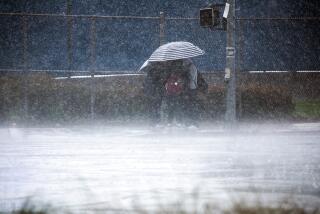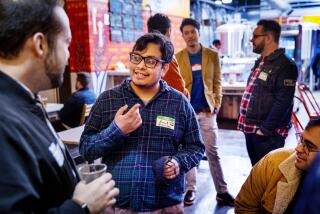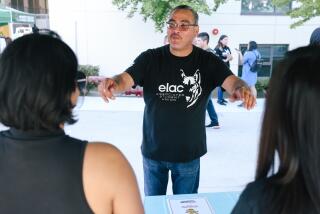Coronavirus could upend education of over 800,000 California college students
- Share via
In a major escalation of higher education’s response to the novel coronavirus pandemic, the entire nine-campus Los Angeles Community College District, almost half of the California State University campuses and numerous other colleges in the state announced Wednesday that they are suspending face-to-face classes and moving to remote instruction.
At public schools alone, including the University of California campuses, which announced their plans to switch to online classes earlier this week, the changes could affect nearly 800,000 students — with some exceptions for those who continue to meet in person.
Caltech, the five undergraduate campuses of the Claremont Colleges, Chapman University, CalArts and Pepperdine University are among the private universities that said Wednesday they would also transition to virtual or online instruction. A graduate student at Caltech is being tested for the virus that causes COVID-19, with results expected Thursday.
None of the colleges reported any confirmed cases of COVID-19 as of Wednesday among students, faculty or staff. Officials said they were taking these actions as a safety precaution and to help protect local communities.
At the K-12 level, the largest school district in Northern California, Elk Grove, has been closed this week. The private Harvard-Westlake School in Los Angeles said it will close both of its campuses until March 27, with online instruction beginning Monday. No Los Angeles Unified School District campus had been closed as of Wednesday.
The move to online education at some of California’s biggest public higher education institutions poses a particular challenge for a large number of underserved students. Across the Cal State system’s 23 campuses, more than half of enrolled students are the first in their families to pursue bachelor’s degrees, and a slightly lower percentage receive federal Pell Grants.
At LACCD, which educates about 230,000 students, the majority are low-income, food-insecure and housing-insecure — including almost 20% who are homeless, according to a 2016 district survey.
“Issues of accessibility to online courses and issues of learning environments have to be considered,” said Audrey Dow, senior vice president of the Campaign for College Opportunity. “However, I think safety does come first.”
Dow said students may lack sufficient internet or broadband access. They may not have quiet spaces to work at home with other family members and children in the background. Or they may have to travel to libraries.
“There are myriad scenarios,” she said. “Not all students will be equipped at home to take these courses, and I think that can be reflected in performance in the class, attendance in the class.“
Schools should ensure that students will not be punished if they struggle in online classes because of these circumstances, she said. That could mean providing summer courses or allowing students to retake classes for free.
At Cal State Long Beach, where classes will be canceled from Thursday to Tuesday with alternative instruction set to begin March 18, some students’ only internet access is the data or public Wi-Fi they access from their cellphone, education professor Lindsay Pérez Huber said. She is grappling with how to hold masters-level discussion seminars online for her students, and to ensure access for the students who may not easily be able to get strong Wi-Fi connections.
“We want to give faculty as much power as possible in determining what’s best for their class and their students,” university Provost Brian Jersky said. “A dance class or essential lab class — those would probably continue to be face to face…. Campus is not closed. We’re just trying to reduce sharply the number of in-person, face-to-face classes.”
These actions are part of a public health approach to “flatten the curve,” or slow the spread of the virus, by reducing instances in which large groups of people will be in the same place.
Computer labs and libraries at Cal State Long Beach will remain open for students to access technology and the internet, and staff as well as student employees will continue to get paychecks even if their jobs change because of shifts in need. “What we’ve agreed to as a campus is nobody will be harmed,” Jersky said.
At community colleges, the shift to online education is already underway at Sierra College outside Sacramento, the first in the California system to announce its planned shift.
Suzanne Davenport, the college’s distance learning coordinator, said about two-thirds of the college’s 900 faculty members already regularly use its online course management platform, Canvas. She is hosting workshops and engaging “faculty liaisons” to help train the remaining faculty members and will host workshops to train students this weekend.
“Accessibility and access is something that we’re planning for and taking very seriously,” said Sierra College spokesman Josh Morgan. He said labs for hands-on courses in nursing, firefighting, welding and other fields will continue to meet in person, and computer labs and other study areas on campus remain open. The college is also bringing in additional computers and planning to make some laptops available for checkout, Morgan said.
At LACCD’s nine colleges, all classes will be canceled Monday and Tuesday to make the shift to online instruction beginning March 18. The district will activate an “online learning call center” to help students and faculty. Exceptions and modifications will be made for some career and technical education classes, as well as hands-on labs, performance classes and physical education courses. All events with a planned attendance of more than 100 people will be canceled or postponed, but campuses remain open. The changes are in effect through at least April 13.
“We stand united with our higher education colleagues locally and throughout the nation that safety is our top priority as part of our mission to provide excellent educational opportunities for our students,” LACCD Chancellor Francisco Rodriguez said. “Prudence needs to prevail here.”
At nearby Compton College, which is part of its own community college district, President Keith Curry said closing the campus or moving instruction online was not yet appropriate or feasible. Not all faculty members have been trained in the online systems — and at a campus where 23% of students are homeless, helping students with basic needs is a top priority.
“What do you do with those students who depend on your shower facilities and food pantry?” Curry said.
In addition, the community college campus offers dual enrollment for local high school students, who also may not be able to take classes remotely.
Private colleges, which have more resources and often serve more well-off students, are not immune to these challenges.
At Claremont McKenna College, where about 20% of the entering classes in recent years have received Pell Grants, all students will be required to return home or find another off-campus location by March 23 — with some exceptions. About 1,300 students, almost all of whom live on campus, attend the college.
“We recognize that not everyone has a good or safe place to go,” President Hiram Chodosh said.
More to Read
Sign up for Essential California
The most important California stories and recommendations in your inbox every morning.
You may occasionally receive promotional content from the Los Angeles Times.












